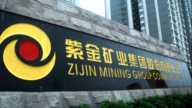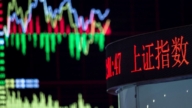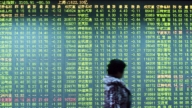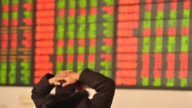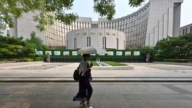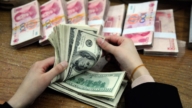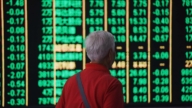【新唐人2014年12月25日訊】在2014年將走進尾聲之際,中國股市經歷了一場戲劇性的高漲回落。大盤僅用五週左右時間,從2400點上漲到3000點,之後出現驟降暴跌,過山車式的股市行情,讓中國股民在寒冬裡著實經歷了一場躁動。外界提出質疑,中國的股市大起大落,到底是誰在操縱?
在中國股市近期上漲之際,中國證券監督管理委員會(China Securities Regulatory Commission)正在調查可能的股價操縱行為。首批捲入調查的18只股票,包括中科雲網、百圓褲業、興民鋼圈、山東如意、湖南發展、鐵嶺新城等全線跌停。目前,涉嫌操縱股市的機構和個人已被立案調查。
《新唐人》特約經濟評論專家傑森•馬:「中國股市歸根到底還是中共想辦法給自己的黨企、央企、政府企業融資的大環境,它不希望這個地方徹底做得太爛,基於這樣的目的,它要維持一點股市的秩序,換句話說,它就得要把長年以來在中國股市存在的操縱股價的行為來打擊一下,至少你要在街上能讓生意做好,總得把一些地痞流氓打擊,或者壓制壓制,但是它的根本目的是為了要給央企、黨企融資。」
據公開的資訊,中國大陸的股市在逼近2014年末的時候,出現了罕見的在短期內的「暴漲暴跌」的現象。
12月5號,滬深兩市成交突破萬億大關,創出歷史新高。12月8號,滬指在時隔44個月後重上3000點大關。12月9號,股市在「瘋牛」狂飆般逼近3100點之後驟降,跌幅5.43%,創2009年8月31號以來的最大單日跌幅,多家個股跌停。股民用「滿倉踏空」、「漲停跑輸」來形容這一輪的股市暴漲暴跌。
《新唐人》特約經濟評論專家傑森•馬:「雖然誰都知道,中國股市實際上是一個賭場,本身來說的話,並不是一個長遠可以長期得到穩定收入的地方,但是因為沒有投資取向,所以大家也都這麼跳進去一試。」
有網友說,中國股市真的連賭場都不如,背後的黑幕管理有貓膩。網友還舉例2014年幾個事件,股票代號600228昌九生化,贛州稀土借殼,鬧劇終結,連續10個跌停,最終散戶買單。代號600087長航油運,堂堂央企,國油國運,黃金水道,門檻之高,不是任何一家企業能媲美,但已經告別中國A股市場,整理期股價暴跌,中小投資者損失慘重,最終進入三板市場。代號601268二重重裝,因為連年虧損,上市4年將退出A股市場,又是一家央企,創造中國股市最快退市企業。
美國南卡羅萊納大學艾肯商學院教授謝田:「這種金融騙局在中國現在有很多很多,我覺得首先對中國老百姓來講,他們缺乏對於金融知識普及性的教育,就是老百姓大部分不知道金融產品的風險,他們現在都是盲目的相信共產黨,相信共產黨的國有銀行,甚至相信國有銀行裡面的職員、官員,這實際上是完全錯誤的。」
根據美國《華爾街日報》報導,中國股市上漲,主要得益於短線投機者押注貨幣政策放鬆,而非投資者長期看好中國經濟。
《新唐人》特約經濟評論專家傑森•馬:「其實誰都知道,中國股市是政策式,政策來自哪?來自中央來自中共吧,所以你要是說中國的股市看啥?不看經濟表現,主要是看政策,一個政策出來遠遠超過很多經濟數據,大家都知道中國數據都可以造假,但是政策往往可以使一個領域從盛到衰,就是一夜間的事。」
大陸財經作家吳曉波說,中國股市的標配不是價值挖掘、技術創新、產業升級,而是「人民日報社論+殼資源+併購題材+國企利益」。他說,這個股市從誕生的第一天就是「怪胎」,就如同米蘭.昆德拉曾經寫的:「事情總比你想像的複雜」,在中國股市發生的那些故事,謎底總比你想像的還要陰暗。
採訪/易如 編輯/黃億美 後製/建銘
Who Is Controlling The Chinese Stock Market?
As the year 2014 comes to a close, the Chinese stock
market experiences a dramatic roller coaster ride.
Within a mere 5 weeks, the market rose from 2,400 points
to 3,000 points before plummeting all the way down.
The highly erratic scene at the stock market made Chinese
investors all the more uneasy and restless in the chilly winter.
The outside world is beginning to question, who is
manipulating and controlling the dramatic rise and fall
of the Chinese stock market?
During the recent rise in the Chinese stock market,
the Securities Regulatory Commission of China investigated
possible manipulative behavior over stock prices.
The first batch of 18 stocks rolled into investigation include
“Zhongke Cloud Network”, “Baiyuan Legwear”,
“Xingmin Wheel”, “Shandong Ruyi”, “Hunan Development Co”,
and “Tieling New City”.
They have been suspended on the stock market.
At present, organizations and individuals suspected of
manipulating the market have already been rounded
up for investigation.
Jason Ma, NTD TV economic analyst: “The bottom line is that
the CCP wants to maintain a positive environment
for investment to fund its party organizations, central
enterprises and other state owned enterprises (SOE).
It does not want to completely mess up the investment scene.
Therefore, it wants to enforce a certain degree of order
in the stock market and its first step is to give the manipulative
elements that have been influencing the Chinese stock
market all these years a big hit.
If you want to run business properly on the streets,
you have to exert some control and pressure
over the street thugs.
However, its ultimate aim is to attract financing
for its state owned and party owned enterprises.
According to public information, the Chinese stock market
experienced a rare short-term “spike” phenomenon
towards the end of 2014.
On 5th December, the turnover for Shanghai and Shenzhen
exceeded the one trillion mark, creating a new record in history.
On 8th December, the stock index climbed to the 3,000 point
milestone after 44 months of slumber.
On 9th December, the stock market suddenly plummeted
after a brief bull rush towards the 3100 point.
The fall of 5.43% was the highest single day decline
since 2009 and many stocks hit rock bottom.
The community of investors described this stock market spike
as “empty and useless hope”.
Jason Ma: “It is common knowledge that the Chinese stock
market is like a casino.
It is not a place to get stable and long term returns.
Without a larger investment strategy or outlook,
everyone jumps in just to have a try.”
Some netizens commented that the Chinese stock market
has a shady management and it is inferior even to a casino.
They cited a few examples in 2014.
Cangjiu Fertilizers, stock code 600228, undertook backdoor
trading in Ganzhou rare earth.
The farce eventually ended after 10 steep falls in its stock.
Changhang Oil Supply, stock code 600087, was a grand
central SOE.
It engaged in national supply of oil and was perceived
by many as a fountain of wealth.
However, in the consolidation phase, its stock price
plummeted and it had to exit the A-share market,
causing heavy loss to small-medium investors.
Another heavy equipment company, code 601268, incurred
losses year after year and had to exit the A-share market
after 4 years of listing.
This central SOE is the fastest enterprise
to delist from the Chinese stock market in history.
Professor Frank Xie from University of South Carolina,
Aiken School of Business: “These financial frauds are very
common in China.
I feel that on the whole, ordinary Chinese people lack
basic education in financial literacy.
Many of them do not appreciate the risks of financial products.
They put blind faith in the CCP and believe in the CCP-owned
banks.
They even believe in the employees and officials working
in these banks.
Their trust is completely misplaced.”
Wall Street Journal reported that the rise in Chinese stock
market is driven by the relaxation of policy over short term
investments and speculations, rather than genuine belief
in the long term outlook of the Chinese economy.
Jason Ma: “Everyone knows that the Chinese stock market
is driven by policies dictated by the CCP.
Therefore, the Chinese stock market does not reflect
economic performance, but rather, the state of party policy.
A policy is far more powerful than economic data.
Everyone knows that in China, data can be fabricated,
and a policy can shut down any field overnight.”
Finance writer Wu Xiaobo said it once:
The standard of Chinese stock market is not based on value
creation, technological innovation, industrial progress
but rather, “commentaries from the People´s Daily,
shell resources, M&A themes and the interests of SOEs”.
He said that this stock market is a deformity
ever since its inception.
Just like what Milan Kundera said, “The reality is more
complicated than what you can imagine”.
The stories behind the stock market in China
are often darker than you think.
Interview/YiRu Edit/Huang Yimei Post-production/JianMing


